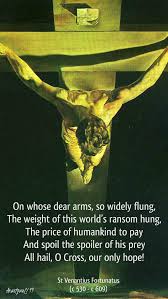Whoever wants to become my disciple, let him deny himself and take up his cross and follow me (Mk. 8:34).
It is by the Cross of Christ alone that we are healed and saved. Our Lord makes the embrace of the Cross the condition for authentic discipleship: Whoever wants to become my disciple, let him deny himself and take up his cross and follow me. St. Paul the Apostle goes beyond the embrace of the Cross, for he says, but far be it from me to glory except in the cross of our Lord Jesus Christ, by which the world has been crucified to me and I to the world (Gal. 6:14). This is the wisdom of the Saints who arrive at this conviction sometimes through their own experience of suffering or through the study of Sacred Scripture and the truths of our faith; as with the Angelic Doctor, St. Thomas Aquinas who wrote that the Passion of Christ completely suffices to fashion our lives. One who arrived at this conviction is what Our Lord Himself defines as a fully trained disciple or one who is fully taught (Lk. 6:40).
Arriving at the conviction of the truth of these words entails growth; personal and spiritual maturity that characterizes a sober and serious approach to life, so that it may be lived with meaning and purpose; for what does it profit a man to gain the whole world and lose his own soul? (Mk. 8:36) To fashion one’s life on the Passion of Our Lord is to recognize the existence and necessity of truth as a guiding principle in one’s life. Truth is not a matter of consensus nor is it determined by any one individual, either for himself or for others. Truth is objective. Recall the words of Our Lord to Pilate: For this I have come into the world, to bear witness to the truth. Everyone who is of the truth hears my voice (Jn. 18:38).
From the earliest days of the Church, we have especially venerated martyrs with a special devotion, for in their witnesses to the truth of God in life and especially in their death they were completely conformed to the Passion of Our Lord. Every saint is a witness to the truth that the word of the cross…is the power of God (1 Cor. 1:18). A cross-less Christianity has been peddled in our time as an improvement of what Our Lord calls us to live; and it has rendered us both unthinking and unbelieving – a dangerous mix. We do well to recall the prescient and prophetic words of Pope St. Pius X, who, more than a hundred years ago warned: : the great movement of apostasy being organized in every country for the establishment of a One-World Church which shall have neither dogmas, nor hierarchy, neither discipline for the mind, nor curb for the passions, and which, under the pretext of freedom and human dignity, would bring back to the world (if such a Church could overcome) the reign of legalized cunning and force, and the oppression of the weak, and of all those who toil and suffer.
The upheaval of the social order, to say nothing of the current attempts to impose a medical tyranny, bears witness to what horrors are experienced when the truth and wisdom of God are forsaken. When we cease to believe in God, we will believe in anything. The passion that the Church is now experiencing is to a great extent the result of mistaken efforts to make the demands of the Gospel more palatable and acceptable to modern man, and of deliberate efforts to alter the integrity of the Church’s infallible teachings. Human nature does not change. Surely God knows what is best for us. The Cross and the Sacrifice that Our Lord offers upon it is the key to understanding God, ourselves and no less the world and its history. This is why Our Lord left us the Holy Sacrifice of the Mass as the pattern for our lives of faithful discipleship; and this is why so much has been done and continues to be done to deny us access to the Mass. Without the Cross Our Lord is not the Redeemer; He is not the God offers Himself in Sacrifice for our redemption and salvation. Without the embrace of the Cross Christianity is not the personal response made to a personal invitation by Our Saviour. At best Christianity is reduced to a philosophy like so many others, a benign expression of humanism.
When Christians allow themselves to be deceived by the prince of this world, when Christians are embarrassed by the foolishness and weakness of God, by Christ crucified, they deprive themselves of the power of God and Our Lord is betrayed. The Gospel of the Mass today directs our attention to the Crucified Christ, the form and content of the Christian message. We preach Christ crucified, a stumbling block to Jews and foolishness to Gentiles (1 Cor. 1:21). The Feast of the Exaltation of the Holy Cross which is celebrated on the 14th of this month of September was first celebrated in the year 335; it celebrates the triumph of the Cross: the victory of love over hatred, of life over death, of humility over pride, of forgiveness over resentment, of sacrifice over indulgence, of good over evil. In the economy of salvation, and in light of the mystery of the Cross, the mystery of self-giving, sacrificial love, we remember that nothing is wasted; no suffering patiently endured is without benefit to ourselves and to our brothers and sisters. The Roman world where the Gospel was first preached was a brutal place, addicted to pleasure at the expense of others – often in cruelty beyond our imagining. It was a time when people were literally killed for entertainment. In God’s Providence it was in such a culture that the Gospel was first preached and heroically lived; perhaps so that it might serve to inspire every disciple of Christ Our Saviour through the ages. Christ conquers, Christ reigns, Christ rules. Christ defends his people from every evil. These words are inscribed at the base of the obelisk in St. Peter’s Square.
We who profess Jesus to be the Messiah, the Christ, our God and Saviour have a share in this victory and in this assurance of consolation and deliverance. His victory is our victory because the word of the cross…is the power of God (1 Cor. 1:18) at work in every time and place. St. John Henry Newman explains: In the Cross, and in Him who hung upon it, all things meet, all things subserve it, all things need it. It is their centre and their interpretation. For He was lifted up upon it, that He might draw all things unto Him. It is our collective task as members of the Church and perhaps more importantly, our individual task as disciples of Our Lord to claim this victory especially in the face of the attempts to impose a medical dictatorship upon whole nations and the individual person. Most especially now we must be strong in the Lord and in the strength of his might (Eph. 6:10). The remedy for our times as it has been for every time is the word of the cross…the power of God (1 Cor. 1:18). Self-sacrifice, penance, mortification, discipline, constancy, steadfastness, endurance – these are not optional for us; they are the expression of our willingness to follow Our Lord who draws us into His saving work and in particular, into His Passion. This is why He left us the Holy Sacrifice of the Mass as the memorial of His Passion; that we might always glory in the Cross of our Lord Jesus Christ, and learn to see and understand all things by its measure.
Christ Our Lord in both His life and death is the pattern for our own life. He is the path of devout humility that we walk. He is the food that sustains us and the Divine Master who teaches us in all things, in all times and in all places to overcome evil with good (Rom. 12:21). In this time of struggle let us heed the words of the Apostle: Be strong in the Lord and in the strength of his might. Put on the whole armour of God, that you may be able to stand the wiles of the devil… For we are not contending against flesh and blood, but against the principalities, against the powers, against the world rulers of this present darkness, against the spiritual hosts of wickedness in the heavenly places. Therefore take the whole armor of God, that you may be able to withstand in the evil day, and having done all, to stand. (Eph. 6:10, 12-13).












